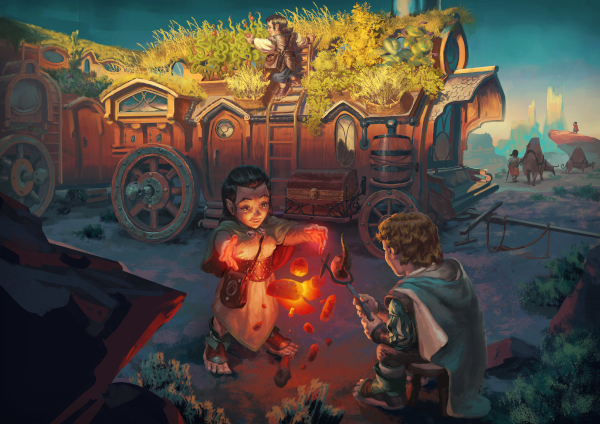Halfling
As a matter of fact, I do resent the phrase "little man", my belligerent friend, for I am not a human at all. To further shed light on your ignorance, I would also like to point out that you are not actually "the strongest warrior in town" either. You see strength is something of an abstract concept, in all reality. If you were to, for example, continue holding me aloft by my shirt much longer, as you seem to enjoy doing, you will find yourself hastily dispatched from the midsection up by the other "little man" standing right behind you -Laster Alibaster, Retired Halfling Explorer
Appearance
Halflings are similar to humans in appearance (albeit smaller), though they exhibit a few unique features that clearly set them apart from simply being “little people” (even if they accept that oversimplified description themselves). Skin and hair coloration for halflings is similar to humans, though they tend toward more tawny or ruddy hues, and eye color is almost uniformly dark. Halfling ears are proportional in size and shape to human ears, though they taper slightly to a rounded point. Their most notable feature is their feet: the soles are typically leathery, calloused and durable as a hide boot. As a result Halflings rarely, if ever, wear shoes, instead opting for a stylish half-shoe that covers the top of their feet. Unlike humans, halflings do not sport facial hair at all. Halfling height varies between 3 and 4 feet, and they typically weigh anywhere from 50 to 70 pounds.
Height: 3ft 0in + 2d6in
Weight: 50lb + 1d20lbs
Ecology and History
Halflings are nearly as diverse and adaptable as humans, and they contain an ever-present wanderlust. The ultimate nomads, Halfings spend most of their lives travelling in large caravans. The caravans consist of a few large halfling families, along with their guests, distant relations, and anyone else looking to travel. The wagons are versatile, comfortable, and are often covered in growing herbs and vegetables. Halflings are always looking out for other travelers, and plant seeds at campsites that can be harvested by the next caravan to travel the road. In this way, Halfling roads are bountiful in wild foods, if you know where to look. Groups of caravans occasionally meet in predesignated locations, creating a semi-permanent halfling village or town with caravans coming and going as they please. It is in these trade hubs that Halfings plan journeys with their kin, deciding when to meet next and where, and also marry off their children to other families. Halfings also love to visit the cities, towns, and villages of other races, particularly humans. There they trade and enjoy life in the settlement for some time before moving on. Halfings often do odd jobs and other work while in the cities, not only to earn money for travel, but also out of a sense of gratitude.
Halflings are slightly longer-lived than humans, occasionally attaining ages in excess of a century. Their culture tends to be both refined and simplistic, with an established but far from rigid hierarchy. Leaders are most commonly elder, wiser halflings who attain their position by unspoken popular consent rather than political contests. A typical halfling travelling village seems tranquil, idyllic, and lackadaisical to most other races.
Halflings enjoy creature comforts, idle chatter, friendly competition, and typically shun positions of power and responsibility. They can be enterprising, though they are rarely avaricious, and may take great pride in their skills. They often make outstanding merchants, carrying goods far and wide, and excel as artists or entertainers with their creativity, nimbleness, and quick wits. The halflings that take up adventuring usually do so out of curiosity or circumstance, and sometimes even out of ambition.
